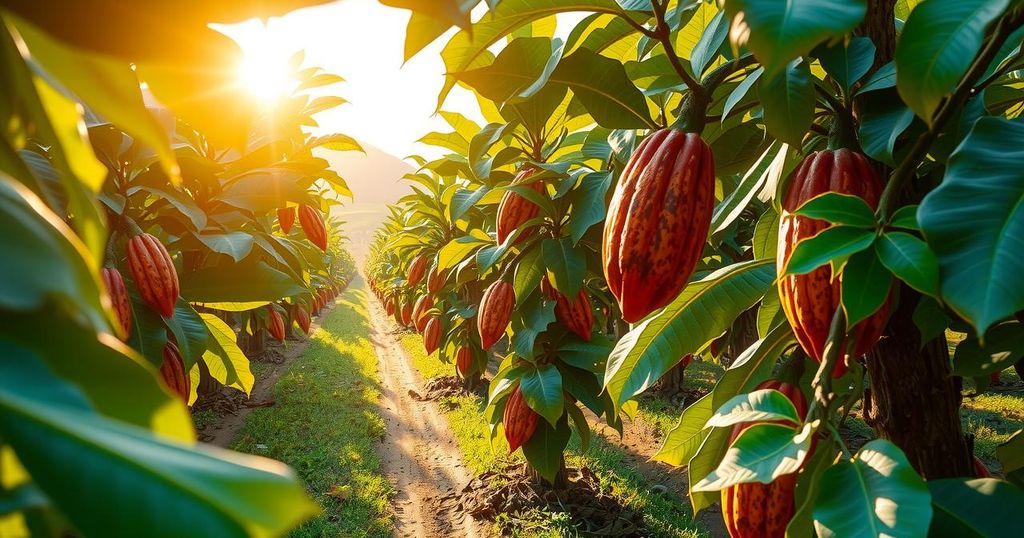Nigeria’s cocoa industry is transforming with soaring prices and global demand, enhancing economic diversification efforts. A 700% increase in cocoa prices signifies a shift benefiting local farmers and attracting substantial investments. This expansion in the cocoa sector provides opportunities for other agricultural commodities and reflects the country’s transition toward a more robust non-oil economy.
Nigeria’s cocoa industry is rapidly evolving, becoming a pivotal element in the nation’s economic diversification strategy. Record-high cocoa prices and rising global demand are catalyzing investments, which may create new revenue channels and reinforce the non-oil economy. As the country seeks to lessen its reliance on oil, cocoa presents not only financial benefits but also an opportunity to regain a significant presence within the international cocoa market.
Recent data shows that cocoa prices in Nigeria have soared over 700% from January 2023, reaching ₦15 million (around US$10,000) per ton by December 2024. This surge is attributed to global supply shortages and growing demand from both Europe and Asia, along with fluctuations in the currency. The Cocoa Research Institute of Nigeria (CRIN) affirms this trend as a significant turning point for the industry.
Experts, including financial professional Oluwatobi Falegan, assert that the boom in cocoa could spark increased demand for various agricultural products, revitalizing Nigeria’s agricultural sector, which was once its backbone prior to oil discovery. He suggests that the success of cocoa could serve as a model for other commodities like cashews and ginger, promoting economic diversification.
In a recent development, British International Investment (BII) announced a partnership with the Johnvents Group, pledging US$40.5 million to boost cocoa production efficiency and sustainability. BII’s coverage director, Benson Adenuga, indicated that this investment would enhance local farmers’ livelihoods while improving Nigeria’s export capabilities and trade balance.
Cocoa is now a significant non-oil export, with over 300,000 small-scale farmers cultivating this crop mainly in southern Nigeria. The World Atlas ranks Nigeria as the seventh-largest cocoa producer globally, yielding around 270,000 metric tons annually, significantly behind Côte d’Ivoire and Ghana, the top producers.
Africa predominantly exports raw cocoa instead of processed products, which limits revenue potential from the lucrative global market, valued at US$45 billion in 2019 and expected to reach US$61 billion by 2027. Countries like Côte d’Ivoire export 72% of their cocoa as unprocessed beans, missing out on the profit margins associated with processing.
Despite exporting approximately 90% of its cocoa as raw beans, Nigeria’s production is beginning to change with improving investment flows and market dynamics. Shortages in leading cocoa exporting nations have heightened interest in Nigeria’s export potential. In 2025, cocoa represented 7.12% of total agricultural exports, highlighting the sector’s growing prominence in trade.
Data reveals that during the fourth quarter of 2024, non-oil sectors, including agriculture, contributed significantly to Nigeria’s GDP, with agriculture alone accounting for 25.59%. Dominic Joshua of Cultivate Africa commented that cocoa could potentially outpace oil revenues in a decade if proactive measures are taken promptly.
Falegan indicates that the adherence to EU standards in cocoa production could benefit other agricultural products, promoting sustainable practices that would align Nigeria with global expectations. The successful entry of cocoa into premium markets could incentivize government investment in agriculture, boosting logistical support and export incentives.
In summary, Nigeria’s cocoa industry is poised for significant growth, driven by record prices and increased global demand. This evolution not only showcases the potential for economic diversification but also highlights the need for sustainable practices and investment in agriculture. The success of cocoa can serve as a model for revitalizing other agricultural sectors, encouraging Nigeria to recover its former agricultural glory and reduce oil dependency.
Original Source: www.independent.co.ug






